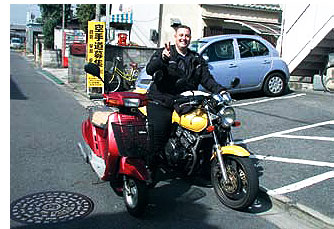

Nicholaos Vogiatzis
University of South Australia, Australia
Exchange to Ritsumeikan University, Japan
Konnichiwa!
Having worked and travelled extensively during my career, I believed that I wouldn・t have too many problems when I arrived in Japan. My supervisor Professor Ikeda (Ikeda-sensei) would be waiting for me at Osaka - Kansai Airport so translation would not be an issue.
Very quickly I discovered what it was like for foreigners who do not speak English when they first arrive in Australia. I could not have Ikeda-sensei with me all the time and so learning to live in a country where English is not spoken by the majority of the population would be something I would have to deal with. Fortunately the people of Japan are an extremely friendly group and they were always willing to help, even if our communication was simply a series of hand signals and grunts.
The food in Japan was also amazing; so much diversity and so many interesting tastes; cuisine is extremely important in Japan, and the ability to understand food as an art as much as it is sustenance adds to the experience.
I was most fortunate to be able to live with my supervisor (Japan is an expensive part of the world), and this added to my experience. Okasa (mother) would always welcome me home at night, and even though we couldn・t speak each other・s language, we made good use of Japanese-English dictionaries.
During my time, and so as to ensure that I wasn・t too much of a burden on my supervisor, I bought a motorcycle; a CB400. As a motorcyclist in Australia, I always considered it a small bike, however in Japan people wondered how I could control .so much power・. There are many people who use motorcycles as a form of transport in Japan; Ritsumeikan University had a capacity for 20,000 motorcycles! There were still more car drivers than motorcyclists so it did make things a little dangerous; nonetheless I enjoyed my Japanese riding. Ikeda-sensei is now also the proud owner of the motorcycle, his kindness was so great that he never allowed me to pay room and board nor for our trip to Mt Fuji (Fuji-yama), so this was the least I could do.
Working/studying in Japan is very different to Australia; they are very strict and they are extremely hard working people. Hierarchy is also important; as a senior PhD student you have much power you can wield, something I discovered by accident. When a student from a lower level asks you for advice, what they are really looking for is direction. I made the mistake once of suggesting something only to find out they treated it as an order; d・oh, I didn・t do that again.
The Japanese have very few vices, the only one would be the consumption of alcohol; no one is offended if you do not partake, but they prefer it if you do. I have many wonderful memories of spending time with sensei and the other students enjoying ourselves at the end of a long hard week.
 There are only a few words that one need learn before leaving for Japan and they are .Hai・ (yes), .Iie・ (no); .komenasai・ (I am sorry), .sumimasen・ (excuse me); .kudesai・ (please, as in may I .please・ have the remote), .・doso・ (please, as in .please・ take one); .arigato・ (thank you, to someone whose is a friend or a lower rank), .arigato gozaimasu・ (polite form of arigato, the .masu・ is pronounced .mas・); .oohayou gozaimasu・ (polite good morning), .konnichiwa・ (hello) and finally .sayounara・ (good bye); they should get you through the first few weeks.
There are only a few words that one need learn before leaving for Japan and they are .Hai・ (yes), .Iie・ (no); .komenasai・ (I am sorry), .sumimasen・ (excuse me); .kudesai・ (please, as in may I .please・ have the remote), .・doso・ (please, as in .please・ take one); .arigato・ (thank you, to someone whose is a friend or a lower rank), .arigato gozaimasu・ (polite form of arigato, the .masu・ is pronounced .mas・); .oohayou gozaimasu・ (polite good morning), .konnichiwa・ (hello) and finally .sayounara・ (good bye); they should get you through the first few weeks.
There is only one thing I would like to mention by way of explanation, many believe that the term .Gai-jin・ (foreigner) is a negative one and that no matter how long you live in Japan you will always be called .Gai-jin (jin means .people)・. Well, that is true, but it is not meant in an offensive way as many would have you believe. My supervisor who is originally from Hiroshima will always be known as .Hiroshima-jin・; all it means is that the person in question is originally from the .place・ first mentioned. If you find yourself in Japan and are referred to as Gai-jin, be proud.
Overall, I can say that when I left Japan, I left my home, my spiritual home. For all when it is said and done, forever I will have Japan in my heart, and the kindness of all the people, especially that of Ikeda-sensei and Okasa, will remain with me for the rest of my life!
© Copyright 2018 CK Group. All rights reserved.
